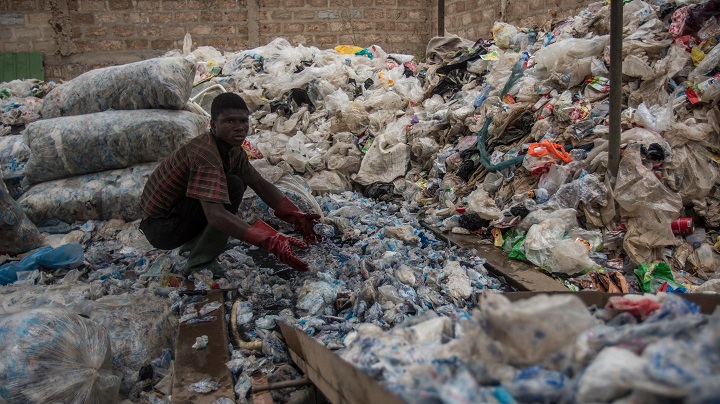11 Dec 2024

Tired Earth
By The Editorial Board

When a huge plastic producer like Coca-Cola says it’s working to solve the plastic crisis, what does that really look like? An investigation published Friday by Bloomberg documents how one initiative in Ghana was used by some of the world’s biggest plastic producers to battle against threats of plastic bans, while failing to deliver on some of its key promises.
Plastic pollution is a deadly problem in Ghana, which creates more than 1 million pounds of trash each year and recycles just 5%. In 2015, floods killed more than 200 people in Accra, the nation’s capital; a later government report found that trash clogging waterways helped to make the flooding worse. There were some calls to ban plastics in the wake of the tragedy.
In response, companies in the region that manufacture consumer products met to discuss how to “put across the strong position that no, banning plastics would not be the way to go,” one policy consultant told Bloomberg. They came up with the Ghana Recycling Initiative by Private Enterprises, or GRIPE, which is described on its website as “an industry-led coalition…with a stake in the plastics sector to integrate sustainable waste management solutions, particularly around plastics.” Founding members of the initiative included Coca-Cola, Dow Chemical, Guinness, Unilever, and Nestlé. In the latter half of the 2010s, GRIPE was mentioned positively at international meetings and collaborated on initiatives with government officials from the UK.
However, as the Bloomberg investigation makes clear, consumer-facing marketing to consumers in Ghana—rather than making any real effort to change the status quo—seems to be all that GRIPE has accomplished in the years since its founding. A 2020 European Commission report on the state of recycling in Ghana found that “little high-impact results have been achieved so far” from the program, despite an “active social media presence” from GRIPE.
A GRIPE program, rolled out in partnership with oil giant Total (which encouraged its audience in one tweet to “join the recycling movement”), installed blue recycling stations at gas stations around two cities. But trackers placed inside plastic bottles by Bloomberg show that at least one bottle never left the recycling station, and when they revisited that station four months after dropping off the bottle, they found it still there, with the station “full to overflowing.” (The firm responsible for recycling the bottles collected told Bloomberg that funding for the GRIPE program, which was provided in part by Total and Coca-Cola, had run low.) In 2021, GRIPE touted a new “permanent buyback centre” for recyclable materials in Accra; Bloomberg found the center unmanned and neglected, and locals told them it had been “abandoned for months.”
Current membership in GRIPE is dirt cheap for the international conglomerates who benefit from the good PR it brings them: documents obtained by Bloomberg show that yearly membership is 45,000 Ghanaian Cedis, or $5,800. (Nestle pays just $1,850.) For a huge company like Unilever, it’s a negligible amount: less than 0.0001% of its global marketing budget. Importantly, GRIPE itself doesn’t pay for plastic collected; rather, it’s purchased by outside partners. Ghana’s lack of any facility that can turn plastic bottles into new ones also makes selling the collected plastic bottles, which will have to be shipped to Europe, much harder.
This investigation illustrates how global corporations and oil companies that are most responsible for the plastic crisis can use campaigns that look like they’re helping to solve the problem they’ve created to instead delay and push against real solutions.
GRIPE is “an image campaign for all companies involved,” Jeffrey Provencal, who founded a Ghana-based plastic products company to try and set up a recycling center in the country, told Bloomberg. “There is no accountability. You can put some money in and say you are part of the game.”
Source : gizmodo.com
Comment